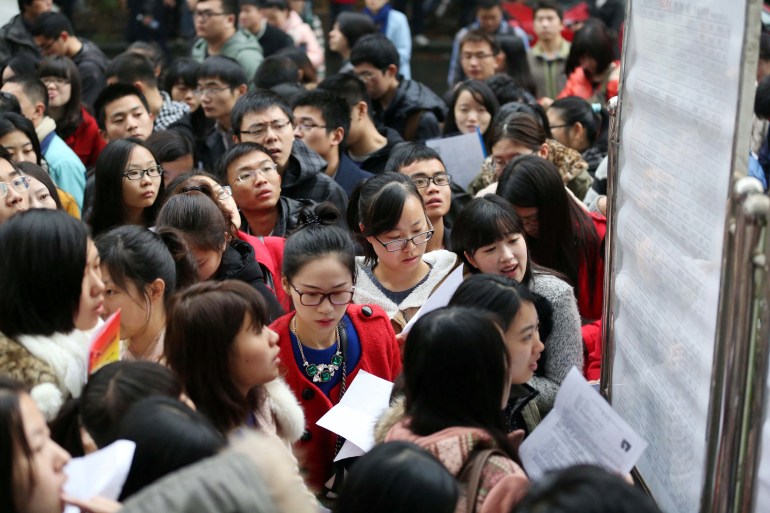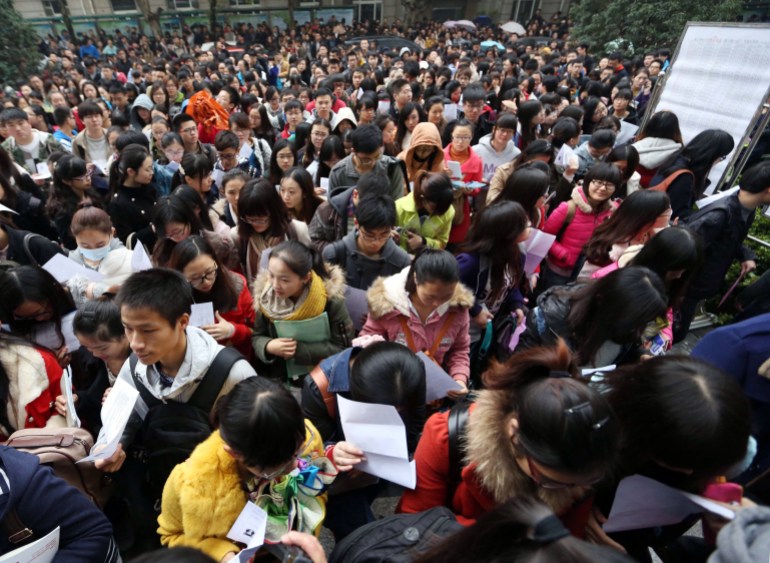A good result on China’s annual national civil service exam is a requirement for any Chinese candidate who wants to be considered for the tens of thousands of vacant civil service jobs that the government seeks to fill every year.
Thank you for reading this post, don't forget to subscribe!Many of the vacant positions are reserved for recent Chinese graduates.
When 22-year-old recent graduate Du Xin sat down for the exam in December last year at a test centre in the city of Shijiazhuang in China’s Hebei province, she had been studying vigorously for six months.
Some applicants even hire tutors to prepare them for the exam.
Candidates are tested broadly on their general knowledge and analytical skills while in more recent years they have also been tested on their grasp of “Xi thought” – Chinese President Xi Jinping’s ideology and vision for China.
Despite her months of preparation, Du knew that the odds that her test result would bring her closer to a government job were slim.
As she began the exam, so, too, did millions of other Chinese youths across hundreds of Chinese cities.
“The competition is fierce,” Du told Al Jazeera.
That year the chance of securing a civil service position was 70 to one.

Therefore, Du was surprised and thrilled when she learned that she did well on the exam and subsequently landed a job as an organiser at the local office of the Chinese Communist Party (CCP) in Shijiazhuang.
This year, the competition looked to be even more fierce as the number of candidates sitting down for the exam at the end of November surpassed three million for the first time.
The number of vacant government positions has not kept up, lowering the odds of securing a job like Du’s from 70 to 1 to 77 to 1, according to the state-run Global Times.
Du is not surprised by the high number of applicants.
“I think a lot of young people in China really want a stable job right now,” she said.

Job security is an ‘iron rice bowl’
The appeal of stable employment was what drew Du to the civil service exam last year at a time of economic turmoil in China.
“I felt a bit lost after I finished my graduate studies, I didn’t know what I wanted to do,” she told Al Jazeera. “But I knew I wanted a job where I could feel secure and have free time, and that made me interested in government work.”
Although employment in China’s civil service rarely pays as well as comparable employment in the Chinese private sector, there are other benefits. Civil servants usually have access to better medical insurance, a preferential pension plan, consistent bonus pay-outs and secure lifetime employment.
The security that comes with a public position has given rise to the nickname, “iron rice bowl”.
Iron rice bowls are coveted by some traditional Chinese parents for their children – not just for stability but because some see obtaining such jobs as a recognition of excellence by the state.

An important aspect of life as a civil servant for Du is the working hours.
“I work from 9am to 5pm, and I don’t have to work on weekends,” Du said.
Many of Du’s friends in the private sector work the 996 system – 9am to 9pm, 6 days a week.
“Compared to them, I have a lot more free time to enjoy my hobbies,” she said.
Yang Jiang was also not surprised by the record number of applicants for China’s civil service exam this year.
Jiang is a scholar of China’s economic policies and a senior researcher at the Danish Institute for International Studies.
The number of applicants has been growing quickly in recent years, and according to Jiang, one reason is the equally high number of Chinese graduates entering the job market.
In 2023 alone, almost 11.6 million Chinese finished their studies, the highest number ever.
But the overarching reason for the high number of civil service exam applicants is the Chinese economy, Jiang told Al Jazeera.
“The economic situation is uncertain in China,” she said.

The Chinese economy has been struggling to reach the growth rates of earlier years, the housing market is in the deepest slump in decades and foreign direct investment struck a deficit in the July-September period of 2023 for the first time recorded.
For Chinese graduates, circumstances look particularly grim: youth unemployment hit a record high of 21.3 percent in June before the authorities stopped publishing the numbers.
“The private sector in particular has seen a lot of layoffs in the economic downturn,” Jiang explained.
“That has naturally made more Chinese graduates look towards the public sector for the sort of job security that is currently missing in the private sector,” she said.
‘They can’t make us disappear’
Like Du, 23-year-old Chris Liao from Guangdong province in southern China graduated last year with a master’s degree in public administration. He also signed up for the civil service exam.
“I didn’t make it past the written exam,” he told Al Jazeera.
Afterwards, Liao was unable to find a job within his field of study, forcing him to work as a cook for a while before he moved back with his parents outside Guangzhou, the largest metropolis in Guangdong.
He is now among the millions of unemployed young people in China.
“I feel like life got really difficult when COVID hit and ever since it hasn’t stopped getting difficult,” he explained.
Liao believes that the government’s COVID-19 strategy is the cause of many of the economic problems plaguing China today.
“So it is the government’s responsibility to do more to make the situation better,” he said.
According to observers, the large number of unemployed youth in China’s major cities is a significant cause for concern for the party-state.
One Communist organisation in Liao’s Guangzhou even presented a plan in March about sending unemployed youths to the countryside to foster rural development.
Such a plan hearkens back to Chairman Mao Zedong’s Cultural Revolution of the 1960s and 1970s during which time millions of urban youths were sent to the countryside in a period of political and social upheaval that caused the deaths of at least two million people.
In January, President Xi also spoke about Chinese youths “revitalising” the countryside.
Liao does not believe that such plans are realistic in modern times, however.
“They can’t make us disappear into the countryside,” he said.
“There are too many of us, and we are growing in number.”

